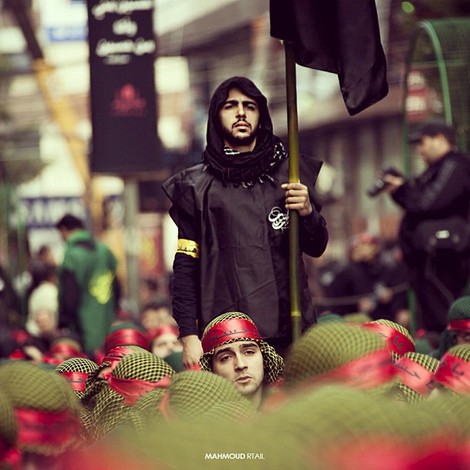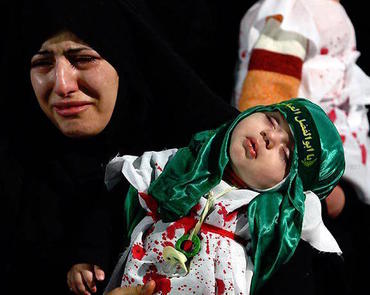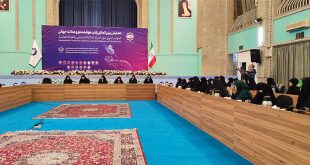1335 years ago, on Ashura;
the tenth day of the new Islamic year, in the early hours of the afternoon, on a sand-dune at Karbala, south of the current Iraqi capital, a convoy of men, women, and children was savagely massacred and 110 were killed by an army of over 30,000. It took the monstrous military force little more than four hours to completely and utterly annihilate the small group.The small camp led by Imam Hussein, though mythically defiant, suffered a crushing defeat. All the men were killed, as well as a dozen children and infants. The remaining women and children were taken into custody. The caravan along with the severed heads of the martyrs was paraded around the nation in a humiliating spectacle amidst demented festivities and celebrations and then, everything was over.. Everything.
sand-dune at Karbala, south of the current Iraqi capital, a convoy of men, women, and children was savagely massacred and 110 were killed by an army of over 30,000. It took the monstrous military force little more than four hours to completely and utterly annihilate the small group.The small camp led by Imam Hussein, though mythically defiant, suffered a crushing defeat. All the men were killed, as well as a dozen children and infants. The remaining women and children were taken into custody. The caravan along with the severed heads of the martyrs was paraded around the nation in a humiliating spectacle amidst demented festivities and celebrations and then, everything was over.. Everything.
Today, over 1.5 billion people around the world come to a standstill on Ashura. A solemn commemoration of the single most tragic event is observed as a pubic holiday from India to Egypt, from Azerbaijan to Yemen, and by communities in every province and capital in the world. It is immortalised with re-enactments and lamentations on a mass scale. In Europe and North America, millions observe Ashura with gatherings as well as processions distinct with their public outpour of emotion. Over a millennium since the event has not soothed the pain, nor has it dissipated its inspiring message. To a quarter of the world’s population, it is a legend so powerful it is truly larger than life.
Knowing this story today is more crucial than ever. First, because it is seen as the only real antidote to the terrorism cancer that has metastasized uncontrollably throughout the world. By carefully examining it we can begin to make sense of the current chaos and bloodbath. Second, because this legend is becoming more and more relevant in shaping international borders at a time when those clumsily sketched lines were drawn by British and French bureaucrats in the wake of WWI. More and more people are turning to this age old encounter to seek inspiration for today’s turmoil.
The battle of Ashura was cataclysmic beyond comprehension. It will make any heart bleed for the savagery manifested by the ideological precursors of ISIS. It was essentially the beginning of a revolution which continues to reverberate to this day. A metamorphosis of ideas that would see the fall of tyrants and despotic systems like domino bricks, and compassion permeating even the coldest of souls.
Below is a very short summary of events that unfolded in Karbala, culminating in the martyrdom of the hero at the center of the legend; Imam Hussein.
 Forty eight years after the death of the Prophet, his nation was in complete disarray. Although it stretched from Africa to the farthest reaches of the former Persian Empire and was a military and financial superpower, the nation was on the verge of imploding unto itself. The Khalif, a totalitarian monarch was akin to the leader of ISIS and showed no resemblance to the ideals of the Prophet or his faith. He reigned with an iron fist and moral corruption had pervaded into every arm of government.
Forty eight years after the death of the Prophet, his nation was in complete disarray. Although it stretched from Africa to the farthest reaches of the former Persian Empire and was a military and financial superpower, the nation was on the verge of imploding unto itself. The Khalif, a totalitarian monarch was akin to the leader of ISIS and showed no resemblance to the ideals of the Prophet or his faith. He reigned with an iron fist and moral corruption had pervaded into every arm of government.
Hussein, the son of Imam Ali, was the only surviving grandson of the Prophet and the descendant of a long line of divinely appointed Messengers. He resembled his grandfather in every sense of the word and was adored by Muslims for his impeccable character. Hussein’s father, Imam Ali, who was the only democratically elected successor to the Prophet, as well as his most trusted confidante and appointed heir, was assassinated while performing prayers in the mosque of Kufa. Meanwhile, his arch-nemesis, Muawyah, son of Abu Sufiyan, was able to seize control of the Muslim empire through his infamously cunning tactics and Machiavellian system of government. He signed a treaty with Hussein’s elder brother, Hassan b. Ali, who had become the legitimate ruler after his father. It was Muawyah’s military superiority that left Hassan with no choice but to agree to this settlement, which included as one of its provisions that government should return to Hassan b. Ali after Muawyah’s death, or to his brother, Hussein, should Hassan be deceased.
However, once he had secured his position and solidified his grip on power, Muawyah moved to annul this agreement. Rather than handing over authority to Hussein upon his death, Muawyah enthroned his son Yazeed, and took the pledge of allegiance for him while he was still alive. It was a lengthy and complicated process, but by using promises and ultimatums, using carrots as well as sticks, tribal leaders were properly incentivized to take him as heir to the throne.
After twenty years of rule, much bloodshed, and widespread oppression, Muawyah died and power was transferred to his Yazeed, in contravention of the peace treaty. A morally corrupt, sexually degenerate, sadistic politician, Yazeed was known by all those who knew him as the poster child of sheer savagery.
People had long tasted the bitterness of oppression under Muawyah and were fully aware of what the nation under his bastard son would mean. So they turned to Hussein, not just because he was the grandson of their prophet, the son of their martyred leader, and the rightful and legitimate ruler, but because he was the most pious, generous, and knowledgeable; the one who best preserved the ideals and values of Islam. In addition to all of this, he was, in the eyes of the faithful, a Godly saint.
Before long, Hussein was inundated with a deluge of letters pleading with him to come to Kufa, his father’s former administrative capital. In their correspondence, Kufans implored him “in God’s name” to come to them and assume the reigns of power. Sensing that he bore a responsibility to uphold justice and prevent oppression, to promote goodness and provide guidance, Hussein rose to the occasion. This had been the mission of prophets before him, and now he felt as though its weight had fallen upon his shoulders and their banner was now in his hand. So he responded to the peoples’ call, not out of aspiration for power or desire for worldly vanities.. Such things were far removed from the character of the Prophet’s closest family members who strived for the sake of the hereafter rather than the sake of this world; but to spread justice and repel tyranny.
 Hussein dispatched his cousin and closest confidante, Muslim b. Aqeel, to Kufa. His mission was to assess the situation and provide council on whether the calls for Hussein to move to Kufa were genuine. He replied to their letters, saying that if their treatment of his cousin shows them to be truthful in their entreaties and ready to assist him in his mission, then he will make the journey to them.
Hussein dispatched his cousin and closest confidante, Muslim b. Aqeel, to Kufa. His mission was to assess the situation and provide council on whether the calls for Hussein to move to Kufa were genuine. He replied to their letters, saying that if their treatment of his cousin shows them to be truthful in their entreaties and ready to assist him in his mission, then he will make the journey to them.
From his own side, Yazeed sent letters to the various provinces of the Muslim empire, demanding that the governors submit to his rule and demand the pledge of allegiance from the people; he ordered them to execute whoever refused, specifically mentioning Hussein b. Ali for two reasons:
• In the depths of his soul, Yazeed knew that he had usurped the rightful place of Hussein and the position that was rightfully his from a number of angles; the least of these was the treaty signed between his father and Hassan b. Ali, the terms of which meant that Yazeed’s government faced a serious crisis of legitimacy.
• People loved Hussein because of the qualities, merits and knowledge he had inherited from his father, his grandfather, his brother and his mother. His family were a family of religious icons. The people also desired him as a ruler because they saw him as sincere and without any inclination towards tyranny or wrongdoing.
Registering his official rejection of the new regime, Hussein refused to pledge allegiance to Yazeed on conscientious grounds — considering him unworthy of any public office — because of his infamous wickedness, violent temperament, and established vile demeanor. Knowing full well that Hussein is the biggest impediment to his rule, Yazeed ordered his governor in Medina to procure Hussein’s pledge of allegiance, or sever his head should he refuse.
After a tense session with the governor, in which Hussein spurned allegiance to Yazeed, he was threatened with execution. In the pitch black darkness, he left his sanctuary in Medina and headed for the Sacred Mosque in Mecca. Whilst there, Hussein received thousands more letters pleading with him to rise up against the tyrannical regime, and come to Kufa. Meanwhile, when his cousin Muslim b. Aqeel arrived in Kufa, eighteen thousand people willingly offered their pledge of allegiance to him as Hussein’s special envoy. Encouraged by these developments, he sent word to Hussein that many were ready to stand with him against Yazeed and that they had categorically rejected the latter’s rule.
Hussein made it clear in various sermons that he was not interested in civil war, nor was he seeking an adventure or to score political points, but to preserve the integrity of the faith and its principles. Having made his position clear, Hussein set out for Kufa with most members of his extended household and a number of loyal men and women. But the situation quickly turned against him as the authorities moved to quell popular dissent in Kufa. Muslim b. Aqeel was apprehended after a violent skirmish and was brutally executed while Hussein was still en route.
The government mobilized more than thirty thousand troops against Hussein and the two sides met in an area known as Karbala. With Hussein’s steadfast refusal to submit to the tyranny of Yazeed, his path was intercepted by an army which also cut off access to water and besieged the small band of men, women, and children. Fully conscious of the looming massacre, Hussein earnestly asked his companions to leave him and save themselves. His disciples, made up of the elderly and the young, the rich and the poor, those noble lineage as well as slaves and peasants. Even a Christian family joined him, all vowing to defend him and his family to the last breath. “May the wild beasts eat us alive if we ever abandoned you” one said. “I would rather be killed, burnt, and have my ashes dispersed in the air, see that done a thousand times before I desert you and your family” said another. They were resolute. So much so, that Hussein declared “I do not know of any companions more loyal than my own”.
With no food, water, or a means to reaching safe haven, the camp of Hussein was ambushed; on the tenth day of Muharram, fifty one years after the Prophet Mohammad, his grandson Hussein’s small band of followers faced a force more than five-hundred times larger than their own.
With only seventy two men still by Hussein’s side, the enemy’s assault was so vicious, wild beasts would be put to sham. Hussein’s companions fought valiantly to the last man and to the very last drop of blood; they displayed such loyalty, courage and conviction that there was no noble quality they lacked. A legendary battle like no other, where the companions of Hussein fought heroically, sacrificing themselves for their leader. Thirst-stricken women and children were murdered. Most of Hussein’s cousins, siblings, and children were murdered by Yazeed’s bloodthirsty mercenaries.
Hussein had a six month old infant named Ali. The child was so parched that he was doomed to die of dehydration, but in a last ditch attempt to quench him, Hussein pleaded with the enemy, “You have killed my friends and my family, and I have no one but this suckling infant.. His mother’s milk has dried, so take him and feed him before he dies.” For the first time, the enemy forces were split, some saying that “if men are criminals, what has the child done to deserve death?”. Realizing the potential for strife within his ranks, the enemy commander ordered the unthinkable. A three-pronged, poisoned arrow was shot, severing Ali’s head from jugular vein to jugular vein as his father watched in shock.
Having committed the most heinous of crimes, the homicidal savages would not be deterred from anything else. With slow, agonizing advances, Hussein who had witnessed the brutal murder of his family, suffered from three days of extreme thirst, wounded from countless stabs, became an altar where thousands of swords, spears, knives, and rocks converged. While reminding them that he was their Prophet’s own son, Hussein was sadistically slaughtered while they cheered and whistled in mad hysteria.
The heads of the martyrs were severed — including the children’s — and were raised on pikes. The families of the Prophet were taken prisoner and sent to Yazeed. They were paraded through a 700km route and given a humiliating display as they were being whipped and tortured.
In the midst of the chaos and savagery, the martyrdom of Hussein and his companions turned them into the quintessential heroes of Shia Islam, epitomizing virtues of faith, nobility and purity, generosity, bravery. As for their enemies, they became symbolic of every evil, falsehood, and vice. Hussein is seen as a man who faced death, so that an entire nation gets to know the true meaning of life.. A man who was killed once, but continues to come back to life a million times over.. One who was slain in solitary, without supporters or helpers, but who has billions marching every year to answer his call.. He was thirsty, only to have the world remember him every time they drink.. A man who was shown utter hatred, only to turn into the focal point of compassion.. One whose light they tried to extinguish, only to become a flame that inspires those seeking a revolution forever. A man who died whilst hungry, yet hundreds of millions are fed in his name.. A man whose tents were ransacked and burnt down, but has millions of homes named after him in every corner of the world..
Hussein became a singular figure who fills history with his grace and grandeur, becoming a meta-historical legend, epitomizing the perennial struggle between good and evil.
 Ijtihad Network Being Wise and Faithful Muslim in the Contemporary World
Ijtihad Network Being Wise and Faithful Muslim in the Contemporary World
